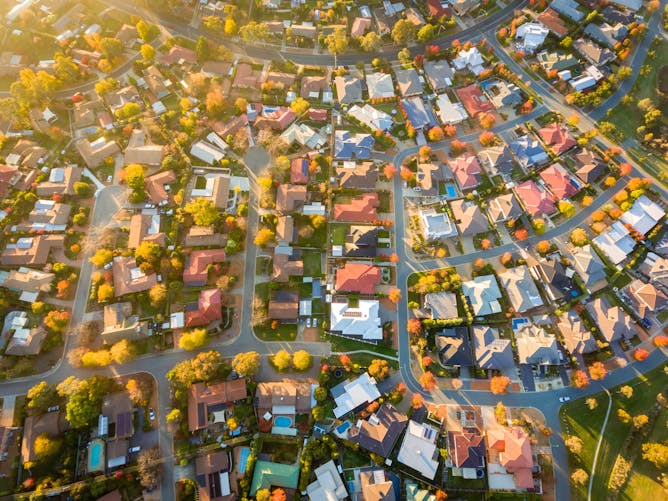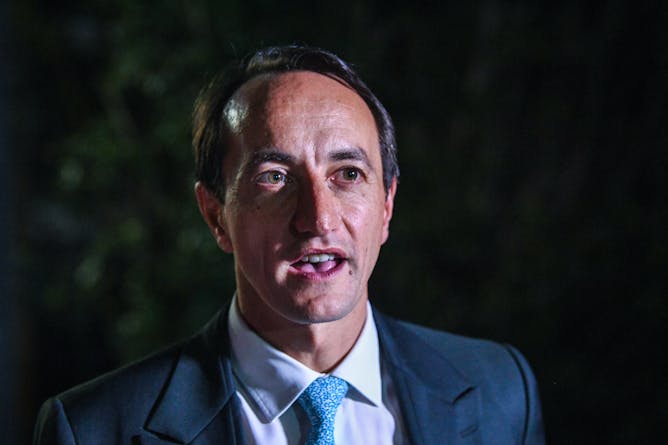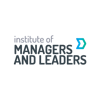|
|
|
Editor's note
|
|
As far too many of us know, the impact of cancer on individuals and communities can be devastating. But how does it affect Australia overall?
To find out, we visualised a rich data set from the Australian Institute of Health and Welfare, and asked two cancer researchers to reflect on the picture that emerged. Associate Professor Brigid Lynch, Principal Fellow at Cancer Council Victoria. says it’s very clear that socioeconomic position has a strong influence on cancer incidence and mortality in Australia.
“The better off people are, the less likely they are to develop most cancers - and they are more likely to survive after diagnosis,” she said.
Search for your postcode, and see how cancer incidence and mortality rates play out in your area.
And we examine whether there is much scope left for the Reserve Bank to boost the economy by cutting interest rates. Not that it needs to at the moment, with Thursday’s employment update showing jobs growing at the rate of 44,000 per month - an astounding 1,400 per day. But if the Reserve Bank did need to cut, it might find the cuts were ineffective in places such as Sydney, where house prices were falling. Richard Holden outlines the
implications of new US research in Vital Signs.
|
Sunanda Creagh
Head of Digital Storytelling
|

|
|
Top story
|

What trends might emerge when we map cancer incidence and mortality rates across Australia?
Shutterstock
Sunanda Creagh, The Conversation
It's clear that socioeconomic position has a strong influence on cancer incidence and mortality in Australia.
|

Dave Sharma - not the PM’s pick.
AAPONE/Brendan Esposito
Michelle Grattan, University of Canberra
The Liberal preselectors of Wentworth have selected Dave Sharma, even though Prime Minister Scott Morrison wanted a female candidate.
|
Health + Medicine
|
-
Ian Harris, UNSW; Denise O'Connor, Monash University; Rachelle Buchbinder
Doctors tend to overestimate how good their treatments are and underestimate the harms that come from them. But many studies have shown knee arthroscopy to no more effective than fake surgery.
|
|
Politics + Society
|
-
Son Vivienne, RMIT University
Allowing for more gender options in the public sphere isn't political correctness gone awry. It's just a small shift in the evolution of how we understand, categorise and define gender.
-
Michelle Grattan, University of Canberra
McGowan and Sharkie have given the government their confidence until the Wentworth byelection - after which they will consult with their electorates.
-
Clinton Fernandes, UNSW
The prosecution wants a closed trial, while the defence wants to keep secret only what's necessary to protect Australia’s national security.
-
Daniella Doron, Monash University
6 million Jews were killed in the Holocaust. What happened then, and how we can keep to the promise – “never again”?
-
Tamar Hopkins, UNSW; Jude McCulloch, Monash University; Leanne Weber, Monash University
A complaints system in which police investigate themselves is hardly likely to instil confidence in communities where police are regarded as the problem rather than the solution.
-
Marilyn Giroux, Auckland University of Technology; Jessica Vredenburg, Auckland University of Technology
Sexism in sport plays out on and off the field. Differences in marketable qualities for endorsement deals as well reactions to male versus female athletes behaving badly are evidence of this.
|
|
Business + Economy
|
-
Richard Holden, UNSW
It is thought that it doesn't help much to cut official interest rates toward or beyond zero, and maybe it doesn't, but new research suggests the answer has a lot to do with the housing market.
-
Roman Lanis, University of Technology Sydney; Chelsea Liu, University of Adelaide; Grant Richardson, Macquarie University; Ross McClure, University of Technology Sydney
The candidates most likely to be chosen as independent directors are those good at avoiding tax.
|
|
Arts + Culture
|
-
Claire Smith, Flinders University; Gary Jackson, Flinders University; Geoffrey Gray, The University of Queensland; Vincent Copley, Flinders University
In the 1940s, the last initiated Ngadjuri man, Barney Waria, gave a series of interviews to anthropologist Ronald Berndt. Almost 80 years later, Waria's grandson wants to share this material with his family.
-
Peter Kirkpatrick, University of Sydney
Across her long career, Dobson was celebrated as a poet who could take the reader beyond the immediate image to another insight.
|
|
Science + Technology
|
-
Jennifer Byrne, University of Sydney
Scientific ideas can get lost in forests of words that lack structure and overuse complex language. Just like Sleeping Beauty, they need rescuing.
-
Michael Milford, Queensland University of Technology; Peter Stratton, The University of Queensland
Scientists and soldiers deal with alien invaders in the new Predator movie, but how does the science stack up? With brains and brawn you'd think they'd know how to keep an alien tied down to a table.
-
Robert Lawry, Australian Bureau of Meteorology
Clouds formed by rising warm air currents are called 'convection clouds'. Because of all the rising air coming up, these clouds can be bumpy on top, sometimes looking like cotton wool or cauliflower.
|
|
Cities
|
-
Kirsty Volz, The University of Queensland
People living with the change and uncertainty of this century need flexible and adaptable housing. Here we look at a couple of examples of what's possible.
|
|
Education
|
-
Kathryn Ross, University of Sydney; Tom Gordon, University of Sydney
The new physics syllabus for year 11 and 12 students in NSW contains no mention of specific women who have contributed to the field, nor their work.
|
|
Environment + Energy
|
-
Britta Denise Hardesty, CSIRO; Chris Wilcox, CSIRO; Kathy Ann Townsend, University of the Sunshine Coast; Qamar Schuyler, CSIRO
Autopsies of 1,000 turtles washed up on Australian beaches paint a grim picture of the impact of plastic debris. Even a single piece can be deadly, and on average 14 pieces equals a 50% fatality rate.
-
Sangeetha Chandrashekeran, University of Melbourne; Anne Kallies, RMIT University; Lee Godden, University of Melbourne; Svenja Keele, University of Melbourne
Smart meters are being rolled out across Australia, offering the opportunity to share data with third parties who promise to help you find a cheaper deal. But this requires strong consumer protection.
|
|
| |
Featured jobs
|

|
University of Tasmania — Launceston, Tasmania
|

|
University of Melbourne — Melbourne, Victoria
|

|
RMIT University — Melbourne, Victoria
|

|
University of Western Australia — Perth, Western Australia
|
|
|
|
| |
| |
| |

|
| |
| |
| |
Featured events
|

|
Level 1, 7 Macquarie Place, Sydney, New South Wales, 2000, Australia — The Institute of Managers and Leaders
|

|
State Library Theatrette, Enter via Entry 3, 179 La Trobe Street, Melbourne, Victoria, 3000, Australia — La Trobe University
|

|
Cinema 2, ACMI, Federation Square, Melbourne, Victoria, 3000, Australia — La Trobe University
|

|
University of Sydney, Sydney, New South Wales, 2006, Australia — University of Sydney
|
|
|
|
| |
| |
| |
| |
| |
|
|
|
|
|
|
|